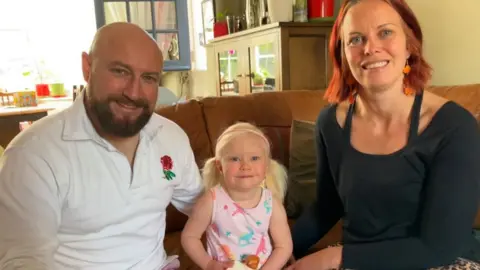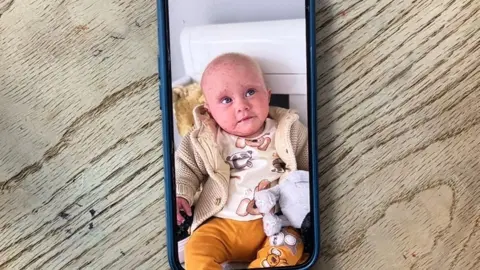'Only 60 people in the UK have our daughter's genetic condition'
 BBC/Seb Cheer
BBC/Seb CheerThe family of a three-year-old girl with one of the UK's rarest genetic conditions are faced with the prospect of relocating to another city in order to get treatment for her.
Autumn, who lives near York, has Hyper-IgE syndrome, which affects her immune system and requires daily antibiotics.
The toddler must spend six months at the Great North Children's Hospital in Newcastle from October, to receive a bone marrow transplant.
She has been told that Father Christmas will deliver her presents in hospital, but knows that after the operation, she will no longer have to take daily medication.
 BBC/Oliver Day
BBC/Oliver DayDoctors first noticed something was wrong when Autumn was born, as she had raised levels of white blood cells, indicating an infection.
However, no infection could be found, and over the next 18 months, the family were "in and out of hospital with various different things", her father Matt says.
It was only during a visit to Harrogate District Hospital when a consultant, Dr Alexandra Hardisty, mentioned she had previously seen a case of Hyperimmunoglobulin E (Hyper-IgE) syndrome.
"It's needle in a haystack stuff - only 60 people in the UK have been diagnosed with this," Matt adds.
Genetic testing confirmed the suspicions, but also found neither of Autumn's parents carried the gene.
"It's a genetic mutation," her mother, Louise, explains.
"It's like a spelling mistake in her genes and it just means that her immune system – although it produces white blood cells so they can go fight the infection - they don't actually know where they're going.
"So they just run around her body and they might stumble upon it, but she needs extra help to get rid of infections."
According to the charity Immunodeficiency UK, common features are "severe eczema, increased susceptibility to infections and markedly raised levels of immunoglobulin E (IgE)".
Isolation period
Autumn's treatment will involve eight days of chemotherapy to destroy existing cells, before they are replaced through a bone marrow transplant from a donor in Germany.
After the eight days she will have "no immune system whatsoever", Matt says, meaning there are strict rules to control any infection risk.
Autumn will spend three months in an isolation room with a carefully-controlled oxygen level, with only one of her parents allowed to sleep there at a time.
Every time they enter, they will need to scrub down and discard any outdoor coats or clothes.
Autumn's pyjamas and teddy, Mrs Pink Bunny, will have to be washed every morning, she will use a new toothbrush every day, and can only eat food provided by the hospital.
"There's a period of time when there's a line in the room and she's not even allowed over the line in the room," Matt adds.
"The hospital say that they expect her to be a bit more resilient than we would even be, because of her age."
Meanwhile, they will "press pause" on family life, Louise says, as she prepares to temporarily close her yoga and personal training business.
The hospital provides accommodation for whichever parent is not sleeping on the ward, but she says they will be "very much passing ships".
The family has already visited the team of medics in Newcastle and "completed the hospital", Matt says.
After visits to "dentistry, CT scans, X rays, the play team, consultants, research teams, professors", he says all three family members had a blood test.
Autumn says she went first to show her parents how "easy" it was: "I got a sticker - I was very brave."
Louise says: "You think, 'how are we going to do this?', but you just do, because it's going to prolong her life and she'll come out of this process with a completely new immune system."
Matt adds: "We had moments when we're like: 'Remember when you were a kid and you'd see those families on GMTV with poorly children trying to go to Disney?' We're now that family. That's now us."
They have received support from a charity, helping families of children receiving stem cell transplants at the hospital in Newcastle.
The Bubble Foundation funds research and toys for the ward, as well as providing advice and reducing the financial burden for families.
"You want to be able to concentrate on the matter in hand," Matt says.
While he is able to continue working remotely during the move, he knows some others "lose their jobs because companies can't afford to keep paying them, so the Bubble Foundation help with a lot of that".
Before the treatment takes place in October, Louise and Matt are completing a number of fundraising challenges, including a fell run and triathlon event.
They are also inviting others to take part in charity days at two gyms, in York and Boroughbridge.
"The objective is to raise awareness and the driver is a bit of a coping mechanism and distraction," Matt says.
Louise jokes: "I think going into hospital in Newcastle for six months is a challenge enough, but I got signed up for it, so let's do it!"
Listen to highlights from North Yorkshire on BBC Sounds, catch up with the latest episode of Look North.
